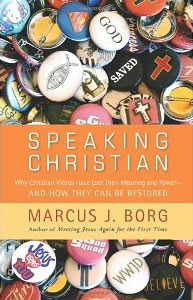Book Notes
 Marcus J. Borg, Speaking Christian; Why Christian Words Have Lost Their Meaning and Power, and How They Can Be Restored (New York: HarperCollins, 2011), 248pp.
Marcus J. Borg, Speaking Christian; Why Christian Words Have Lost Their Meaning and Power, and How They Can Be Restored (New York: HarperCollins, 2011), 248pp.
If you've been a church person for a long time, you might resonate with Marcus Borg that many "Christian" words have lost their punch due to over familiarity. On the other hand, many other people in our culture are ignorant of a basic vocabulary of faith. Borg hopes to reclaim our Christian lexicon by proposing "more authentic" and "alternate" meanings to words like sin, salvation, mercy and righteousness. Unfortunately, what he's really done is written the same book again for about the tenth time. If you've read Borg before, you'll find nothing new in this book.
As he's done before, Borg locates the problem in what he calls a "heaven-hell framework" and "literal" reading of the Bible concerning the afterlife, sin and forgiveness, Jesus's substitutionary death, and believing in this story for salvation. He specifically says that he doesn't intend to sound pejorative or patronizing, but he's only partially successful in that regard (like when he writes about the faith of his youth). To restore our Christian vocabulary, Borg proposes a "historical-metaphorical" approach to reading the Bible that he says offers more not less, a "surplus of meaning."
Borg rejects doctrines like substitutionary atonement (p. 98: "it is not in the Bible") and the "factuality of the empty tomb" (p. 112: "irrelevant"). For him salvation is not about a future in heaven but about personal and political transformation today. He admits that sin is an important Biblical concept, but says it should not be our "macro-metaphor" for our relationship with God; we do better to include other concepts like exile, idolatry, sloth and hubris. Borg says he is "agnostic" about heaven and the afterlife, but also that he's "convinced that when we die, we do not die into nothingness, but we die into God" (201).
Borg is one of a few prominent New Testament scholars who writes for a general audience, who is not embarrassed to declare his passion for a life of faith, who shares examples from his own life, who is both unapologetic but irenic in presenting his views, and on top of it all is a good writer. After reading a half-dozen of his books, I'd enjoy something fresh and creative from him. In the mean time, if you want to renew your vocabulary of faith, I recommend Amazing Grace, A Vocabulary of Faith by Kathleen Norris, and Wishful Thinking; A Seeker's ABC by Frederick Buechner.


